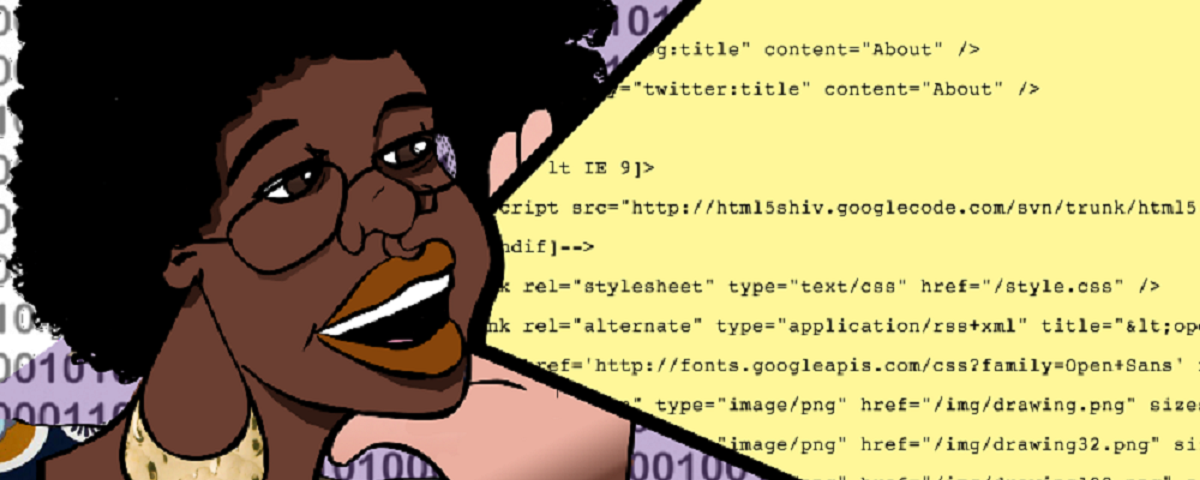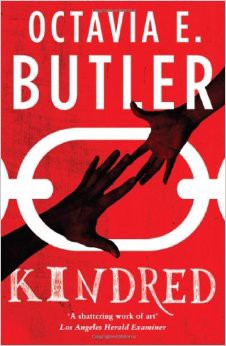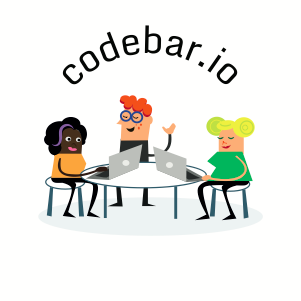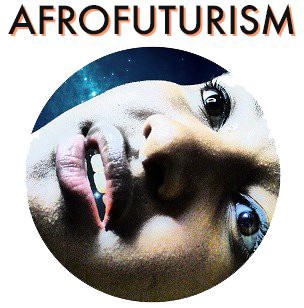
As part of our Afrofuturism coverage, we’re featuring interviews with makers, artists, and thinkers from around the world. Afrofuturism is not just an aesthetic–it’s just as much a framework for activism and imagining new technologies. We’re interested in how the movement can make a practical difference in the lives of those from whom the thought culture draws.

Olu Niyi-Awosusi is a software developer from the United Kingdom. We took some time to chat with her about being black in tech, and how Afrofuturism can encourage more engagement with science and technology among the black community.

Florence Okoye: So Olu, tell us all about you.
Olu Niyi-Awosusi: I’m from the United Kingdom, but I have Nigerian Yoruba heritage. I work for a stealth mode startup as a junior software developer. In case you don’t know what a stealth mode startup is, it means I’m like a particularly rubbish James Bond–I can’t tell you what I do, otherwise they’d have to fire me.
FO: Sounds like you’d make a better James Bond than James Bond–he’s not known for subtlety. What’s your biggest motivation to work on the kind of projects you do?
ONA: I’m really motivated by interesting technical challenges, coupled with passion and a good reason to do the thing I’m doing. The reason can be moral, a sense of innovation, or even just curiosity.
FO: Have you always been interested in working in tech?
ONA: I’ve always been interested, I just didn’t think about it as a career. Neopets [a virtual pet website] was my first gateway into coding, as I got to build a simple HTML and CSS page, which unfortunately was lost in a purge–so I’ll never see my first site again.
I enjoyed electronics in school but never thought to do a General Certificate of Secondary Education (GCSE) in it, so that was that as far as a career in tech was concerned. I never thought much about my love of computers.
Fast-forward to university, where I studied philosophy. I found out about Codecademy in my first year and was immediately hooked but kept hitting walls. In my final year, I decided I wouldn’t go into the third sector [nonprofit sector] and would focus on using my tech career to do good. I started taking my dabbling more seriously with Skillcrush, Free Code Camp, and other online learning platforms until I hit another wall and decided learning in person would be best.
FO: So as well as self-teaching, did you do any boot camps? I’ve seen a few like General Assembly where you can take the time out to learn new skills and get a professional portfolio out of it.
ONA: Parallel to this I did a couple of awesome career development programs, firstly Spark and Mettle. Through them I heard about State of Ambition; this ultimately led me to Founders and Coders, which teaches full-stack JavaScript for free. The rest is incredibly convoluted history.
FO: What’s your opinion about diversity in the U.K. tech industry?
ONA: We really need to work on it. I can count the number of black women developers I know on one hand. I think it’s not just the hallowed pipeline that needs to be concentrated on; there are so many people like me who have always had a passion or even just an interest, who given the time, guidance, and energy could contribute so much.
FO: Right–and technology can be used to tackle some of the serious inequalities faced between ethnic and socio-economic groups.
ONA: Exactly!
FO: Do you think it’s important to get more black people into tech? What do you think is the most effective way of achieving this goal?
ONA: I think getting more black people into technology is very important. When voices are excluded it diminishes the possibility of innovation, the finished product, and the quality of the teams they aren’t part of. I think the most effective way of achieving this is to signal boost willing black developers, to include us more in the narrative of what a developer is, and to make ourselves more available to curious people. For instance, I struggled to find any people of color or specifically black tech groups.
FO: When did you first hear about Afrofuturism?

ONA: I first heard about Afrofuturism on Tumblr, as an aesthetic. I’ve read a few Octavia Butler books, but I’m not a big fan. I really wanted to like Kindred, but I wanted some form of explanation for what happens. I am super interested in sci-fi and fantasy though–the most recent thing I’ve read was Dune, which I understand as a masterpiece but find to have aged poorly.
FO: Do you think there’s a general perception that black people aren’t interested in sci-fi? Personally, I find it really odd because a lot of hip-hop and R&B uses sci-fi imagery in music videos.
ONA: Yes, definitely. I find it odd too that it’s seen as such a strange thing for people of color to be “nerdy” in any other way but book smarts when I know so many people deeply invested in these worlds and characters, even though they aren’t represented.
FO: What do you make of the Afrofuturist scene right now?
ONA: The best thing is the thriving community that seems to be springing up around it. You can meet the best people! The worst part to me is either the lack of concrete science or the focus on ancient Kemet, which replicates the common narrative of the rest of Africa being undeveloped.
FO: Well, I’ve noticed an increased interest in West African cultures “¦
ONA: I think anything that can deepen the aesthetic is good, so I guess we agree there. But there are other issues that Afrofuturism could help tackle, like encouraging young black people to take ownership of science and tech. I think this could help shake up the sciences–it seems the more educated we become the more we look toward the Western canon for leadership, unlike in the arts–and tackle strains of anti-science attitudes within the black community but in an informed and holistic way.
FO: I hear you. The skeptic community is still very much dominated by white men, which doesn’t help deal with legitimate problems black people can face with respect to the medical establishment.
ONA: Right. That’s why I think, in theory–with Afrofuturism used not just as an aesthetic and artistic movement–it is incredibly powerful. Black people are not really ever shown as leaders in technical innovation; we could flip the narrative and empower people to take control of their technology now and in the future. I don’t mean to diminish the arts, as Mae Jemison (an astronaut) was inspired by Uhura from Star Trek. Planting the seed of possibility can be so powerful. In the case of those at intersections, gaining the power to create things that reflect their realities using science, technology, engineering, and math (STEM) would be incredibly powerful. So many good ideas stay locked at the margins due to the inaccessibility of the sector.
FO: That’s why the new community-based self-teaching initiatives are so important. You volunteer with Codebar, which always makes me see you as a revolutionary spreading the tech-resistance to the masses.
ONA: I’ve taken more of a backseat with Codebar now that I have work, but I got involved initially as a student. Codebar teaches people of color, women, and LGBT people how to code using either in-house tutorials or through a project a student is working on, with a volunteer coach working with a pair or one to one. I decided to become a coach after finishing my boot camp, and I’m so glad I did. It’s incredibly rewarding and helps cement what you do know.

FO: What kind of things would you like to see more of in Afrofuturism?
ONA: More detailed, overwrought sci-fi and fantasy. More films. More accounts of how this affects real people, too. More technical innovation, hubs, and groups springing up around the idea. Oh, and a new name would be amazing. Seeing as I’m very digitally focused, I’m volunteering Afrodigitization, and maybe people could call themselves Afrodigitalists.
FO: A call to arms! Would you consider yourself an Afrofuturist?
ONA: If I’m allowed to largely ignore the narrative provided to me by the stuff I’ve seen so far [laughs], I would definitely, tentatively call myself an Afrofuturist.
You can follow Olu on Twitter @oluoluoxenfree.

How We Get To Next was a magazine that explored the future of science, technology, and culture from 2014 to 2019. This article is part of our collection of conversations about Afrofuturism, curated and edited by Florence Okoye of Afrofutures UK. Click the logo to read more.

